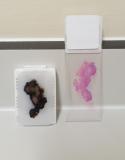Test Directory
KRAS mutation analysis
Containers - Adult

FFPE block / H&E slide / Pathology report
|
|
Laboratory Site
Old Dalkeith Road
Edinburgh
EH16 4SA
Transport arrangements
Referral specimens should be sent directly to Molecular Pathology at the above address (see transport recommendations). For patients with pathology specimens held within NHS Lothian there is no need to arrange transport of specimens.
How to request
KRAS mutation analysis can be requested individually or as part of either the lung cancer panel or the colorectal cancer panel.
Testing for NHS Lothian patients can be requested by email to molecular.pathology@nhslothian.scot.nhs.uk. Referral requests must be accompanied by a completed request form.
Availability
Monday - Friday. 09:00 – 17:00
Anticipated turnaround
An integrated Molecular Pathology report should be available within 10 working days. See results.
Static information/disclaimer
The pyrosequencing test is accredited to ISO 15189. The NGS test is also accredited to ISO 15189:2012
Please note: alternative methodologies may be used. Full details will be included in all reports.
General additional information
The KRAS protein is a small GTPase involved in regulation of cellular proliferation, survival and differentiation. It frequently occurs as a mutated activated form in a number of different cancer types. KRAS mutation analysis is carried out as part of the colorectal cancer and lung cancer testing panels.
KRAS mutation analysis is carried out using PCR followed by pyrosequencing or NGS to detect mutations in exons 2, 3 or 4 (codons 12, 13, 61, 117 and 146) of the KRAS oncogene, which account for the majority of clinically relevant ‘hot-spot’ mutations. In colorectal cancer KRAS mutation analysis is usually carried out in a panel with NRAS mutation analysis.
In lung cancer, codons 12, 13 and 61 account for the majority of clinically relevant KRAS mutations and are most commonly associated with adenocarcinomas from patients with a smoking history (approximately 40% incidence).
For clinical advice on appropriate investigations, please contact our Molecular Pathology team.